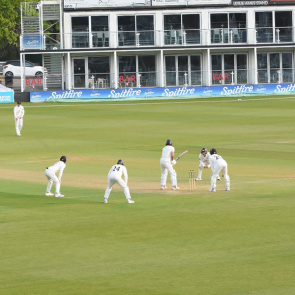Gloucestershire's past glories can return under stewardship of Richard Dawson
6 May 2020
This article, written by Scyld Berry, was originally published by The Daily Telegraph. You can read the full story here.
No county has been so influenced by its past as Gloucestershire, except perhaps the other county celebrating its 150th anniversary, Kent. So often in British life, the Victorian past and its massive infrastructure dictate.
Like an oil-rich country, Gloucestershire could sit back and wait for their next great batsman to come along. First WG Grace, then Gilbert Jessop, then Wally Hammond and, when he retired in 1947, along came Tom Graveney, though he had to leave for Worcestershire and acquire some steel in his soul before being fulfilled as a great batsman. Why bother creating pathways when for the first 100 years you have such talent on tap?

A difficult gig for Richard Dawson, therefore, when he became head coach in early 2015, aged 34: no more great batsmen, no other star players, no budget. Yet Dawson has worked wonders in red- and white-ball to make the most of limited resources. Like England’s head coach Chris Silverwood, and the head coach who led Essex to the championship and T20 titles last season Anthony McGrath, Dawson was born and brought up in Yorkshire, played for the county, and had a few games for England, without cracking it at international level.
“He is very, very detailed with his tactics,” says the Gloucestershire allrounder Benny Howell about Dawson. “He doesn’t sleep much because he spends so much time going into detail - like at Cheltenham he worked out that so many runs went to the third man boundary that we don’t bother with a gully and always start with a third man. But he is old-school in that he keeps it simple for us, and he is always ready to throw balls at you in the nets.”
From 1998, when Gloucestershire jettisoned Courtney Walsh, to 2014, Gloucestershire won three championship matches at Cheltenham College. Since Dawson took charge, they have won seven of 11 matches - and the last couple have been tight finishes, when that third-man tactic could well have made the difference.
Winning on the result pitches at Cheltenham and a few others on the road, while batting deep to secure high-scoring draws with plenty of bonus points at Nevil Road, took the county back to the first division after being demoted in 2005.
“He has also installed a belief in us that we are good enough to be up with the best, as for a while we had been very timid as a club and as players,” Howell adds about Dawson. “Now guys believe they are good enough to play for England and beat any team on any given day.”
Dawson, though he made a decent Test debut at Mohali in 2001-2, was not that much cop as an offspinner - his arm went beyond the vertical - but he was ever an enthusiast and started coaching as a sparky student at Exeter university. Never timid either: he got behind Brett Lee in Australia in 2002-3, when not everyone in the England team did that.
Thrifty, as a Yorkshireman, Dawson has renovated his house near the ground, and he can spot a bargain by seeing something in players that other counties have not. Ryan Higgins - from Zimbabwe via Middlesex - was the leading allrounder in the second division last season. Had there been a county championship this summer, it would have been fascinating to see how the young Afghan legspinner Qais Ahmed fared under Dawson.

Head coach of England Lions last winter when they whopped Australia A in the ‘Test’ in Melbourne - a fine statement ahead of the next Ashes - Dawson is destined for the top: Silverwood’s successor but one? And he could bring with him James Bracey, either as a wicketkeeper-batsman as he was with the Lions, or as a compact and patient lefthanded Test number 3.
Chris Broad represented England as soon as he left Gloucestershire for Nottinghamshire, but Bracey would be the first Bristol-born cricketer to make his Test debut for England - while playing for Gloucestershire - since David Smith in 1961, almost 60 years ago. Such has been the absence of pathways in the county since grammar schools produced Jessop, Hammond, Graveney, John Mortimore and two other stalwarts in Arthur Milton and David Allen.
One of the county’s initiatives to celebrate their 150th birthday was inviting 150 schools to visit Nevil Road,or the Cheltenham Festival, which might be the start of a future pathway. Another initiative, valuable if matches are staged behind closed doors, is to live-stream with six cameras at Bristol, covering every blade of grass, not the two which have been the national norm.
Nevil Road itself has never looked lovelier than it did when locked down - or at least the nearest it has been to handsome, against the background of new apartments. Why an exposed field beside such Dickensian buildings as the Muller Orphanage was originally chosen is inexplicable - unless there is truth in the rumour that WG Grace was a big mate of the developer. Was there something in it for WG when he declared Nevil Road to be “one of the best grounds in the world”? Wouldn’t put it past him.
Latest news
-

Bracey heroics rescue Gloucestershire as fourteen wickets fall on day one
25 April 2025
-

County Championship Preview | Gloucestershire v Leicestershire
24 April 2025
-

Board Update – Co-opted Members
23 April 2025
-

Report of Members' Working Group meeting - 31st March
23 April 2025
-

Gloucestershire take control on final day, but resilient...
21 April 2025
-

Kent rally after Glos set huge first innings total
19 April 2025



